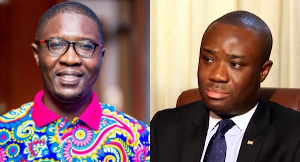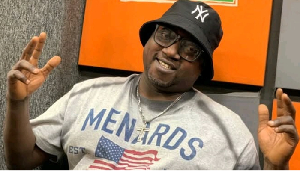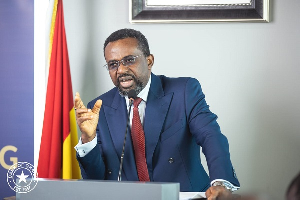Accra, Feb 10, GNA - Human beings were made to live as one and recognise each other as the same but the achievements of some people and the privileges they enjoy either through illegal or legal means place them in a better position in society than others in terms of shelter, food and clothing, which are the basic necessities of life.
For this reason, some people have to be called the less privileged, disadvantaged, vulnerable and poor and are undermined while others are termed well to do, rich, privileged and strong.
The strong or economically sound in society have the upper hand and command respect and also have a say in whatever decision is being taken in a community.
The same is said of countries in the world, which are divided into developed, advanced, first world or rich and others underdeveloped, third world, developing, backward or poor countries.
The developed countries, Europe, America and others have taken the destiny of the poorer countries, especially Africa into their hands and decide what is good for "the developing African Continent".
The ethnic wars, conflicts and human rights abuses being reported daily in the world are due to the class differences in the society. It is, therefore, nothing but the social pressure, the depression and suppression that people go through that force them to revolt or rebel against the so-called super powers and demonstrate against certain decisions which might have negative side effects on their daily lives. However, it seems unrealistic to think of people ever becoming one with the poorer countries reaching the standards set by the international world community.
People and World Leaders could minimise these differences and work together to bring progress and relief to the under privileged groups. The world today is being called a global village because technological advancement has brought countries closer in principle. On computer and satellite, people are able to watch what is happening in the world around just by a click of the mouse or pressing a remote control.
What is this global village that is being trumpeted about when other people living on this planet have still not seen a computer or watched news on any local television channel not to talk of satellite communication?
THE YAWNING GAP
This disparity is widening the knowledge and socio-economic gap between the rich and the poor and placing the rich in a more advantageous position and making the race very tough for the poor. A number of people do not earn salary or income to sustain them, that is to say they are unemployed but they must also live. These are the poor ones in society, who have no say and even if they muster the courage to say something it is not taken as very important or relevant. World Leaders should remember that " the voice of the people is the voice of God" and the "people" here, to me is the deprived majority, who live mostly in the rural and deprived areas and who only rely on agriculture for their livelihood and sustenance.
The poor people are divided into urban poor and rural poor. Poverty is staring at the world. It was, therefore, not surprising when former South African President, Nelson Mandela in a news report recently urged World Leaders "not to look the other way from poverty," during a mass rally in London.
He said; "I have to say to all those Leaders, do not look the other way - do not hesitate to recognise that the world is hungry for action not words. Act with courage and vision."
Mr Kofi Annan, UN Secretary-General, also challenged World Leaders to muster the political will to come up with real proposals that would end hunger in the world when he spoke at a meeting of Heads of State in New York last year and urged governments to mobilise additional resources to combat hunger.
He said: "The world was falling short in its efforts and progress at reducing poverty, citing the slow pace in implementing policies which has resulted in the worsening of hunger situations in some parts of the world. It is not to say that the Leaders should put money in the pockets of the poor but the root cause of hunger should be attacked with pragmatic ideas. Corruption, bureaucracy, nepotism, tribalism and wars should be stopped."
It is absolutely true that the world needed action to squarely deal with the issue of poverty. Africa is set to be the hardest hit as a visit to any village or town clearly shows visible signs of poverty on the faces of the people.
BBC television reports on Africa always look out for such features and as the saying goes, "picture no lie" the poor and malnourished children are clearly showcased.
The situations in Darfur and Cote d'Ivoire as well as Congo, Sierra Leone and Liberia are very disturbing. It was relieving to hear of the good news last week from Uganda that there had been a signing of a ceasefire agreement on the 18-year war between the Government and the Lord's Resistance Army.
Thank God Liberia and Sierra Leone also seem to have come out of war and the huge number of refugees have left the shores of Ghana and other neighbouring countries to take part in the first post war election in their countries.
The sudden death of Togolese President, Gnassingbe Eyadema and the action taken to swear in his son as President tells a lot about Africa. Questions like, do Africans really understand democracy are raised. The people are in a desperate situation and this has caused the African Union (AU) and Economic Community of West African States (ECOWAS) to express their disgust at the action.
The step taken by ECOWAS to resolve the problem is in the right direction and one only hopes that Faure Gnassingbe would see reason and get out to re-enter the Presidential Palace in Lome through the front gate instead of scaling the wall.
Since the attainment of political independence African Leaders have been struggling to shake off the dust of imperialism and colonial ideas. They have become addicted to the old paradigm of development, which continues to sink deep into their thinking and their whole approach to addressing the concerns of the people they are to serve. They should look within the Continent and see how best they could design alternative approaches to the solution of the Continent's development issues since the age old centralised planning approach had not made the desired impact.
One major bane of the poor is that what is meant for the poor do not get to them. It is common knowledge that huge loans contracted by governments of developing countries are stolen and kept in bank in developed countries.
Former President Sani Abacha of Nigeria and President Mobutu Sese Seko of Democratic Republic Of Congo (Zaire) readily come to mind. Many people in the developing countries are confined to live below the poverty line of less than one dollar a day while their Leaders swim in opulence.
Babana, a young unemployed man, told the GNA that he went out one day and when he returned his wife had left home leaving behind their three children.
"Madam I want my children to go to school but I do not have money to pay their school fees and sometimes I am unable to give them money to go to school. It is not that I do not know the value of education. I really finding life unbearable".
Babana lives with all the children in one room. He sometimes find work as a labourer to masons, who might be engaged by some one to build a house or do some work for him or her.
GHANA'S APPROACH TO ELIMINATING POVERTY
The Ghana Poverty Reduction Strategy Document 2003-2005 clearly outlines various approaches to tackling and improving the situation among the poor in Ghana.
The question, however, is how effective are these strategies? A survey conducted in 1999 revealed that the Upper East, Upper West, Northern Regions were the poorest regions.
In Upper East nine out of every 10 people were poor; eight out of 10 people were poor in the Upper West Region and seven out of 10 were poor in the Northern Region.
No wonder, a large number of the unemployed youth in the Northern Region have migrated to Accra, the Capital and Kumasi to work as porters popularly called "Kayaye," just to eke out a living. About half the population in the Central and Eastern Regions were classified as poor.
The Document, therefore, aimed at reducing overall poverty from 39 per cent to 32 per cent; reducing extreme poverty from 27 per cent to 21 per cent, increase gross primary school enrolment from 77.6 per cent to 82 per cent for all and that of girls from 71 per cent to 80 per cent. The Document target's a reduction in the death of children under five years from 110 to 95 for every 1,000, reducing women who die during child birth from 200 to 160 out of every 100,000 and also improve the growth rate in agriculture from 3.8 per cent to 5 per cent. Improve access to safe water from 70 per cent to 78 per cent in urban areas and from 40 per cent to 54 in rural areas among other objectives.
Ghana has entered its final year of implementing these objectives and can the country prove that it would be able to reach these targets by the end of the year 2005.
The Document itself acknowledged the fact that in the past, not much was done to move beyond drafting good plans to actually implementing them.
The Document stressed the need for an efficient and effective public and private sectors to carry out actual implementation.
CHINA'S APPROACH POVERTY REDUCTION
According to the 2000 UNDP report, China, with a population of about five billion people initiated major economic reforms in 1978 and achieved remarkable successes in reducing abject poverty. The successes provide many lessons for countries with less developed programmes.
Rapid economic growth has been a major factor in China's success but progress has been most notable when growth has been concentrated in agriculture and in poorer regions.
It is time for Ghana to do the same and save her people from poverty.
Opinions of Thursday, 10 February 2005
Columnist: GNA














